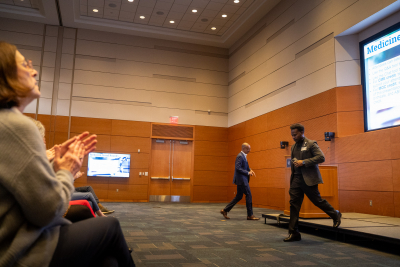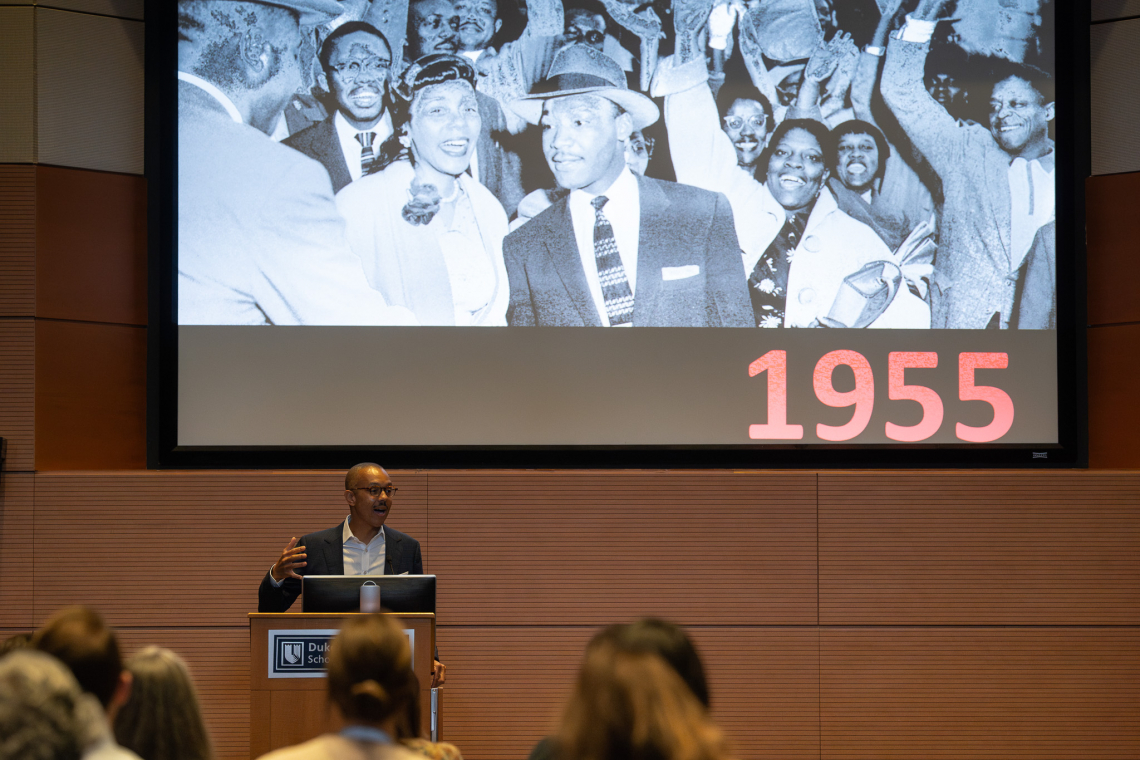Dean Bennett Delivers the 2024 Martin Luther King Jr. Memorial Duke Medicine Grand Rounds
“We still lack adequate obesity treatment solutions for our higher risk populations.”
Gary Bennett, dean of Trinity College of Arts & Sciences, delivered the 2024 Martin Luther King, Jr. Memorial Medicine Grand Rounds on January 12 to an engaged audience of faculty, students and staff in Duke’s Department of Medicine. The title of his presentation was “You Have to Keep Moving Forward: Obesity in High-Risk Populations.”
Bennett, a professor in the department of Psychology & Neuroscience who also holds appointments in Global Health, Medicine and Nursing, is the founding director of the Duke Digital Health Science Center. For 20 years, he has been studying how incorporating digital strategies into clinical treatment of obesity can improve outcomes. His development of the interactive obesity treatment approach (iOTA) has been supported by over $20 million in grants from the National Institutes of Health.
In the development of iOTA, Bennett and his team embraced digital technology in part because it opened promising avenues for decreasing disparities in obesity care between different populations. Traditional clinical weight loss interventions are costly. They require highly trained providers and significant discretionary time on the part of the patient to attend ongoing appointments over weeks and months. Racial and ethnic minorities, low-income populations and people without adequate health insurance are less likely to seek or adhere to weight loss interventions.
With the interactive obesity treatment approach, Bennett explained, patients and their providers set a simple, attainable goal — for example, cutting 500 calories out of their diet each day. Instead of complicated calorie-counting routines, the patients are surveyed about their habits and lifestyles to determine the best way to create the desired deficit. A sustainable treatment plan is then created that is specific to each individual’s preferences and circumstances.
Through personalized texts and calls (which Bennett said have been shown to be more effective than apps at creating meaningful engagement), patients are prompted to update their progress while receiving coaching and feedback. He emphasized that he doesn’t foresee digital solutions taking the place of health care professionals, though. “Digital extends and amplifies what people can do,” he said. “It’s culturally tailored feedback that is leveraged digitally.”
Despite concerns about a digital divide, Bennett and his team haven’t found access to cell phones as a barrier with any of the populations they’ve studied. In fact, being able to reach lower income patients where they are, rather than asking them to come to a clinic, seems to have increased long-term engagement.
“We’ve seen strong outcomes,” Bennett said. “Most patients participate for at least a year.”
When even a 5% loss in body fat can produce positive health outcomes, such as a reduction in rates of diabetes and heart disease, a program like iOTA can be life-changing. Bennett noted that in one study, many of the patients maintained their weight loss even four years after the trial ended. Participants also noted a 67% decrease in the symptoms of depression, a tantalizing corollary that suggests the wide-ranging benefits of even modest weight loss.
Bennett is passionate about the promise of his research to reduce disparities in the treatment of obesity, and said that being able to share it with his colleagues through the Martin Luther King Jr. Memorial Medicine Grand Rounds is especially gratifying.
“I have come to Grand Rounds for much of my career as a faculty member and it’s an absolute honor to be asked to speak here,” he said. “I’ve seen some extraordinary people give this presentation, and it means a lot to me both because of the importance of celebrating Dr. King, but also because it’s been a venue where people who have done work in the disparity space have been able to share that work in ways that really resonate with a broader community.”
“Every year we look for a speaker who exemplifies lessons we’ve learned from Dr. King,” said Dr. Laura Svetkey, vice chair for Faculty Development & Diversity in the Department of Medicine. “Through my collaborations with Dr. Bennett over many years, I was familiar not just with the brilliance he brings to his research but also his commitment to equity. He’s the ideal person to speak to us today.”
The Martin Luther King, Jr. Memorial Medicine Grand Rounds is sponsored every year by the Minority Retention and Recruitment Committee in the School of Medicine.






